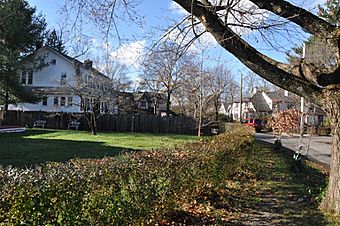Morton Road Historic District facts for kids
Quick facts for kids |
|
|
Morton Road Historic District
|
|

Houses on Morton Road
|
|
| Location | Morton Rd. at Morton St., Newton, Massachusetts |
|---|---|
| Architect | Ramsey, Gilbert Miles; Et al. |
| Architectural style | Colonial Revival, Bungalow/Craftsman, Tudor Revival |
| MPS | Newton MRA |
| NRHP reference No. | 90000010 |
| Added to NRHP | February 16, 1990 |
The Morton Road Historic District is a special neighborhood in Newton, Massachusetts. It's like a time capsule showing how a small group of homes was planned and built over 100 years ago. This area was carefully designed in 1915. The houses were built between 1915 and 1928. They mostly share similar styles, like the Craftsman and Tudor Revival looks. Because of its unique design and history, the district was added to the National Register of Historic Places in 1990.
Contents
What is Morton Road Like?
Morton Road is a short street shaped like the letter "L". It's in a quiet part of Newton, just north of Commonwealth Avenue. The road connects Morton Street on one side to Royce Road on the other.
The Homes of Morton Road
The district includes six main houses that give the area a very similar look. These homes are built in either the Tudor or Craftsman styles. There are also two other houses. One is a Colonial Revival style home at 12 Morton Road. The other is a Four Square style house at 20 Morton Road. These two homes are a bit smaller. However, they still fit in well with the overall feel of the neighborhood.
How Morton Road Was Built
The Morton Road Historic District is a great example of a small neighborhood planned in the early 1900s. In the late 1800s, this whole area was meant to be a large park. The park would have included Bulloughs Pond, which is nearby. But the park idea was too expensive and didn't happen. So, the area grew slowly with homes until the mid-1910s.
The Architects Behind the Design
Morton Road was developed in 1915. The plans were created by Gilbert Miles Ramsey, an architect we don't know much about today. Ramsey is credited with designing two of the houses. The firm Dow, Harlow & Kimball also designed two homes. John V. Pearn designed one house. Another architect, Harold Ramsay (who was not related to Gilbert Miles Ramsey), designed one as well. Harold Ramsay was a very busy architect in Newton during the first half of the 20th century. He even lived close to this area.



